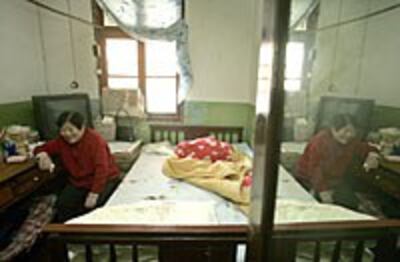
HONG KONG—Sex in China has long been a taboo subject, associated under communism with the worst traits of decadent bourgeois society.
But rapid social change and a growing gap between rich and poor are blurring old boundaries in a sexual revolution that has as much to do with a fast-changing economy as with affairs of the heart.
While the trafficking and exploitation of disempowered rural women has been widely reported, lesser known phenomena include a massive increase in part-time prostitution among the country’s elite, and a U.S.$12 billion market for consumer sex products.
One caller to RFA’s Listener Hotline program highlighted the issue recently in his comments on a sudden upsurge in prostitution in his hometown.
Sex issues 'systemic'
“I don’t think you can put this problem down to a problem of morals or economics of the sex workers themselves—rather, it’s a systemic problem,” the caller said.
“For example, you read articles about university students who sell themselves. It seems to be something that affects the morality of even very young people. I think that these stories shed some light on the real situation of China today,” he added.
In a recent crackdown on Internet porn in the southeastern province of Fujian, police told local media they had arrested 29 people between the ages of 19 and 33 for offering online sex shows and photographs, the majority of whom were university graduates. One of those arrested was a university lecturer.

China-based dissident Yu Jie said the problem stemmed from economic hardships caused by Beijing’s dismantling of its cradle-to-grave socialist welfare system.
“Reform of the university system in the 1990s brought huge changes to higher education, the corporatization of the colleges, and resulted in large increases in tuition fees,” Yu told RFA’s Cantonese service.
Students struggle to make tuition
“When I enrolled at Beijing University in 1992, a year’s tuition was 500 yuan (U.S. $62). But now I’ve seen receipts for tuition fees of anything from 5,000 to 10,000 yuan (U.S. $1,238) for one year,” Yu said.
“So under such desperate circumstances, students will do pretty much anything for money, and the sex industry offers them a way to make some money.”

What is more shocking for more traditionally minded Chinese to grasp, is evidence from Web-based commentators, writers, and local media that suggests that young university and even high school students are motivated just as much by a taste for the high life and sheer curiosity as by poverty.
Sex education, while gradually being introduced in some localities across China, is still largely lacking amid widespread controversy over what should be taught to young people.
A recent survey found that sex education had a significant impact on the way high-school students in Shanghai conducted their sex lives, limiting potential damage to themselves and others.
Need for education
“Increased sexual activity brings economic, social and, especially, health concerns,” the study, published in the June issue of International Family Planning Perspectives said.
“More and more Chinese youth are grappling with issues related to contraception and pregnancy, sexually transmitted infections and HIV, and sexual coercion,” it said.
Those who engaged in a controlled sex education program were more likely to use condoms and were less likely to coerce their partners sexually, it said.

But the authorities seem more concerned with limiting public access to sex education than with promoting it, commentators said.
Last December, the government banned a ground-breaking TV talk show that aimed to discuss sexuality through expert interviews, viewer call-ins, and the use of erotic imagery from movies.
“The Chinese authorities...on the one hand still have the sort of mindset...in which they expect to control what happens culturally, to control the way people think,” U.S.-based author Meng Lang told RFA’s Mandarin service in an interview at the time.
Women unhappy with married sex
“On the other...people want to pursue their own happiness in life, and this attitude has become well established now. The trouble is that there are still very strict controls on freedom of speech in China.”
Spending patterns among the urban middle classes give some idea of the speed of social change in recent years.
Since China opened up its sex toy industry in 1993, for example, it has seen an explosion of sex shops, now estimated to number around 20,000.
Annual turnover of sex products in China, including condoms, was worth more than 100 billion yuan (U.S. $12 billion) in 2003 and is expanding at around 30 percent a year, official figures show.
And there are some signs that state-controlled media are slowly becoming more willing to address such a taboo-laden topic.
Last weekend, the official Xinhua news agency reported the results of a survey showing that around one-quarter of Chinese women are not satisfied with sex in their marriages.
Call to legalize prostitution
While 54.2 percent of the female interviewees said sexual life played a significant role in marriage, a quarter of women admitted they were discontented about the quality of sexual intercourse with their husbands, the agency reported.
The survey, jointly launched by Chinese Medical Association and Chinese Sex Science Society, was cited at a sexual medicine forum in the southwestern province of Sichuan.
It found that 12.4 percent of Chinese women had seldom or never experienced sexual pleasure, while only 3.4 percent of men said the same. Around 10 percent of men said they were dissatisfied with their married sex lives.
U.S.-based sociologist and economics professor He Qinglian said the government should accept the current high demand in society for paid sexual services and legalize prostitution.
“I know the Chinese Communist Party doesn’t even want to think about this, but really it’s much better to legalize it and have it under official control,” He said in response to the caller to RFA’s Listener Hotline.
“Because there are already more than two million sex workers in China as it is. And that’s not including those people who sell sex on a casual basis: I’m talking about the full-time professionals. So this is an enormous problem.”
Original reporting in Mandarin by Jiang Nan and Democracy Salon, and in Cantonese by Grace Kei Lai-see. RFA Mandarin service director: Jennifer Chou. RFA Cantonese service director: Shiny Li. Translated, written, and produced for theWeb in English by Luisetta Mudie. Edited by Sarah Jackson-Han.
